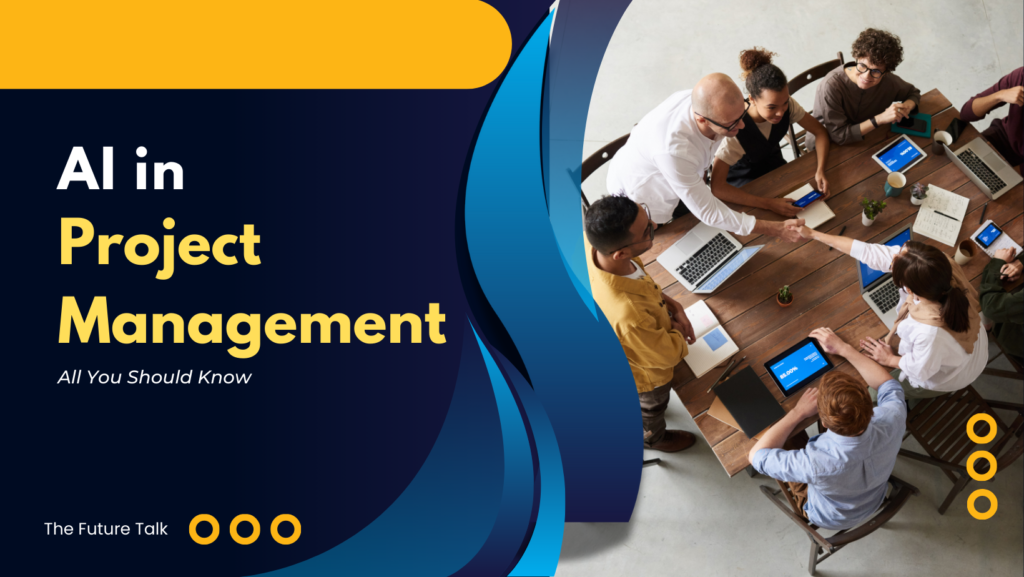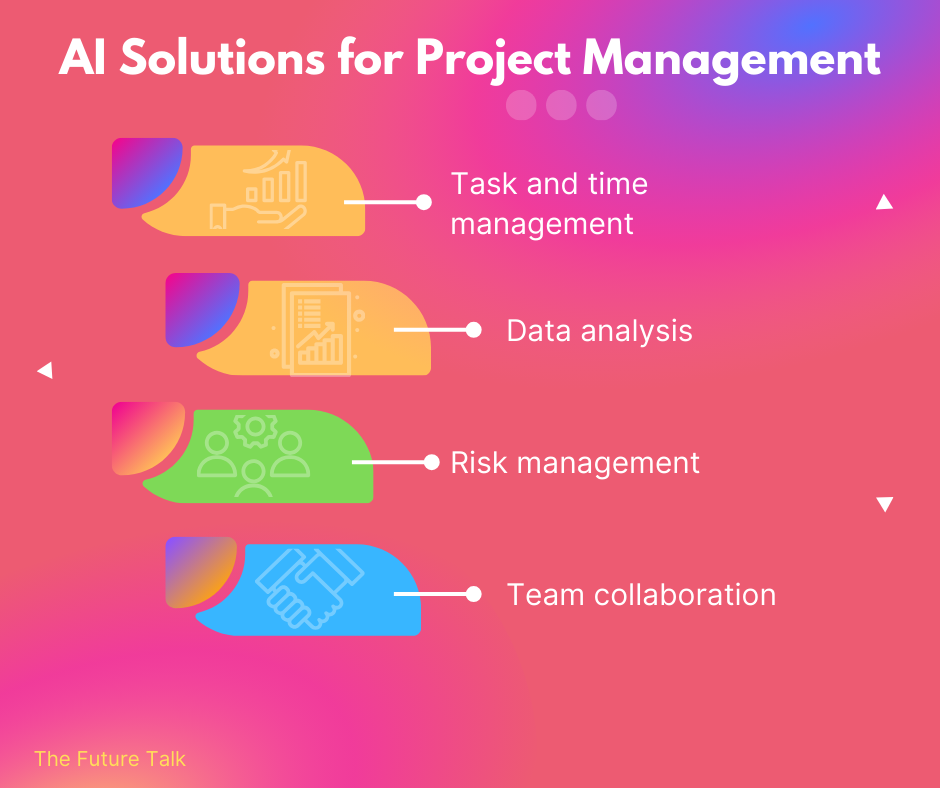Gartner estimates that AI will handle 80% of project management tasks by 2030. However, the company emphasized that AI will not replace project managers.

Artificial Intelligence (AI) is rapidly transforming businesses and creating new avenues for industry leaders to drive innovation. Since project management plays a crucial role in ensuring the successful implementation of projects and accomplishing business goals, AI makes a transformative shift in it.
According to Global News Wire, the global market of AI in Project Management is predicted to grow at a CAGR of 17.5%, from $2.25 billion in 2022 to $5.09 billion in 2027.
A research shows that 77 per cent of project management professionals are optimistic about AI. Only 8 per cent of organizations stated they had no current intentions to integrate AI into their workflows, while 93% of project managers reported a favorable return on investment from their company’s AI project management tools or tech investments during the previous year.
How Will AI Help in Project Management?
According to Gartner, AI will handle 80% of project management tasks by 2030. However, the company emphasized that AI will not replace project managers. “AI is going to revolutionize how program and portfolio management (PPM) leaders leverage technology to support their business goals,” said Daniel Stang, research vice president at Gartner. “Right now, the tools available to them do not meet the requirements of digital business.”
Artificial intelligence helps improve core areas of project management, including budget management, scheduling, time management, and quality control.
- By evaluating previous expenditure patterns and project data, artificial intelligence (AI) can predict budget overruns, allowing managers to make adjustments instantly.
- AI can perform automatic scheduling using historical trends, team availability, and data from comparable previous projects.
- AI-powered solutions enable proactive measures to keep the project on schedule by tracking project schedules and possible delays in real-time.
- By using predictive analysis and continuous monitoring, AI’s ability to learn from past data ensures that quality criteria are satisfied.
Why Do You Need AI in Project Management?
AI helps project managers by automating and streamlining various tasks. With AI-powered project planning tools, businesses can streamline their planning process by automating tasks like scheduling, risk assessment, and resource allocation. AI also provides significant advantages that improve project efficiency, accuracy, and decision-making through its capacity to evaluate data, predict results, and automate tedious processes.
Other advantages of using AI in project management include time-saving. Since artificial intelligence automates repetitive tasks and minimizes the need for manual data entry, it saves project managers’ time, allowing them to focus on strategic planning and decision-making.

Data-Driven Insights
AI-enabled tools analyze vast volumes of data quickly and accurately. This provides businesses with valuable insights for data-driven decision-making. AI systems can also spot trends, patterns, and potential risks by assessing past project data.
For example, AI-powered analytics tools like Power BI or Tableau can integrate project data from various sources to provide interactive dashboards that highlight key performance indicators (KPIs) such as task completion rates, resource utilization, and budget trends.
Enhanced Task Management
In project management, task management is a crucial aspect. With AI-powered task management tools, businesses can automate the assignments of tasks. They can even use the tools to track progress in real-time with intelligent recommendations for task prioritization.
Using machine learning algorithms, AI-powered tools analyze historical data and learn from past performance for task allocation and scheduling. These tools enhance efficiency by automating tasks and reducing manual intervention.
For example, chatbots built within project management platforms, such as Microsoft Teams or Slack, can answer team members’ regular questions about deadlines, task updates, and resource availability, freeing up managers to focus on crucial decisions.
Risk Mitigation
To identify potential risks early in the project lifecycle, AI-powered risk management tools assess past project data. AI alerts managers of plan deviations and suggests mitigation techniques to minimize risks and ensures project success by continuously observing project indicators and outside variables.
For example, using historical data, industry benchmarks, and external factors like market conditions or regulatory changes, risk assessment platforms such as Riskalyze or Active Risk Manager use AI algorithms to evaluate project risks.
Through the use of AI’s capabilities in data analysis, predictive modeling, automation, and risk management, project managers can consistently provide successful results, streamline processes, and reduce risks.
Also Read:
- Entrepreneurial Innovation: What Impact Does AI Have on Entrepreneurs?
- Top 10 Skills to Stay Relevant in The Age of Artificial Intelligence (AI)
How Can You Implement AI in Your Project Management?
AI has the potential to enhance workflows, minimize manual labor, and expedite procedures, whether you are leading a small team or a large organization. Here are some best practices on how you can implement AI in your project management workflows:
Define your project objectives: Clearly defining the objectives you want to achieve from AI in project management workflows will help you with an implementation strategy.
Begin with Pilot Project: To test the effectiveness of your AI integration in your project, you must begin with a pilot project.
Select the right tools: As there are various AI-powered tools available out there, selecting the right tools that align with your project management needs is crucial.
Focus on Data: You need to ensure that you have high-quality historical data so that AI can analyze it. More pertinent data increases AI prediction accuracy.
Key Takeaways For Project Managers
Artificial intelligence (AI) provides project managers with great potential in terms of carrying out unique ideas for successful projects. They must harness the power of AI to grasp each and every opportunity the technology brings out for them and their business.
Improved Decision-Making: AI facilitates predictive analytics that helps project managers gain data-driven insights into potential project outcomes.
Routine Task Automation: By automating repetitive administrative tasks, AI frees project managers which allows them to focus on strategic decision-making.
Enhanced Resource Management: AI helps project managers with resource management optimization by balancing workloads.
Risk Mitigation: AI helps project managers deal with potential threats to project timelines, quality, and costs, significantly improving risk detection and mitigation.
Improved Collaboration: By streamlining communication channels and providing real-time project insights to all stakeholders, AI encourages collaboration and communication.
Wind Up
The use of artificial intelligence (AI) in project management is rapidly gaining importance. The technology allows project managers to better their time management, enhance decision-making, and increase scalability and productivity. AI also offers various automation tools that project managers can leverage based on their business objectives.
It is also essential for professionals to choose the right tools and ensure the quality and security of the data. What are your thoughts on how AI can further enhance the capabilities of project management professionals?
Also Read:
Stay tuned for our next article in this series on AI in Project Management and advance your game in today’s competitive marketplace.